Signing your infant or child up for daycare can be totally scary. Finding a place you trust can be tricky. This list of questions to ask your infant daycare will help you find the perfect fit for your family.
There are a variety of different style daycare centers throughout the US. It’s a good idea to check out several in your area and see what fits your family needs best. Don’t be shy in asking the tough questions – each child care center has a different culture and vibe! Trust your gut!

During college I worked at a daycare center. While there were so many staff that were wonderful and truly loved the children (myself included) there were some child care providers that were clearly burnt out and over it. I definitely wished some parents would ask to shadow and ask questions before registering their kids – it was not the best environment for some of those kiddos.
While the perfect daycare may not exist, there are so many wonderful daycare providers that are ready and waiting to love on your child. Finding good daycare options in you area can take time and patience. I would always recommend going on a daycare tour and asking lots of questions to ensure your child is in good hands.
The following questions will help make sure your potential daycare provider is the best option for your family.
30 Key Questions To Ask Potential Daycares
What is the staff-to-child ratio?
Each state has different qualifications and teacher-to-child ratio requirements depending on the child’s age. Many centers go above and beyond and make the ratio even lower. This means your child will get even more attention and love throughout the day as each caregiver will have less children to watch.
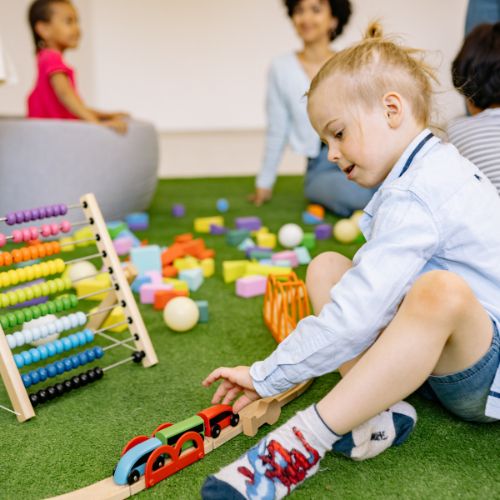
A lower staff-to-child ratio means more one-on-one time for your little one and likely more opportunities for crafts, projects, and possibly outings. Keep in mind the daycares with lower ratios may mean less staff and smaller classrooms. They may be harder to get your child into and have long wait lists.
If you are looking at an in-home daycare center, the child-to-caregiver ratio will be different and based on the ages of the children being watched. A licensed child care provider will need to follow state requirements to ensure compliance with child ratios.
What qualifications and training do your staff members have
Knowing the qualifications and training of the caregivers can give you peace of mind regarding the quality of care your child will receive. Some education-based centers may have teachers with teaching degrees, while others may just require a high school diploma or some college. Some centers follow education programs like Montessori, Reggio Emilia, or other play-based learning programs. It’s also a good idea to ask if ongoing training occurs, or if a person is trained once and never again.
It’s also important to know if they have infant CPR and first aid training and what sort of infection prevention policies they have.

What is your approach to discipline?
You’ll want to find a daycare center that has a similar parenting and child raising philosophy to you. Knowing how they discipline can help you ensure that it aligns with your own parenting style and values.
Different daycares have different ways they deal with problematic behaviors. It’s important to know how your child will be disciplined, but also to know how behaviors from other kids will be handled as well. For example, how will you be notified if your child has bitten another kid? What if your child has been bitten? Those situations are unavoidable when you get together a group of young children, but knowing how it will be handled can help determine if a daycare is a good fit for you.
How do you handle emergencies?
Knowing the daycare’s procedures for handling emergencies, such as accidents or illnesses, can help you feel confident that your child will be safe in any situation.
Each childcare center is required to have emergency plans so don’t hesitate to ask to see theirs.
What security measures do you have in place?
Safety is a concern of every parent and some of the most important questions you can ask.
Here are some important safety questions to ask:
- Are there cameras in place? Who has access to them? Some daycares have cameras in each room that parents can log into to watch.
- Who is allowed to enter the building and are they buzzed in or can anyone walk inside?
- If children are brought outside, how do you keep track of each child? What is the protocol if a child is missing?
- How will you make sure the right child is released to the right person?
- Does the day care center hire substitute teachers and through what agency?
- Will there be any additional staff in the building throughout the day?
In addition, it’s important to know about the childcare centers staff. Are there staff background checks? Is ongoing education offered to the caregivers? Any quality daycare should be properly vetting their staff and offering them opportunities for growth.
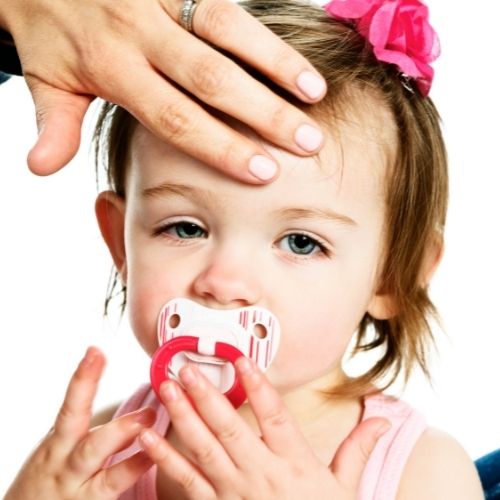
What is your illness policy?
Understanding the daycare’s illness policy, including when children are required to stay home and when they are allowed to return, can help prevent the spread of illnesses among the children. It’s no secret that kids in daycare get sick often so knowing the daycare’s policies may help your little ones stay healthy.
Daycare centers will not allow your child to come with fever, nausea/vomiting, or diarrhea, but how long will they have to wait before returning? What about rash or stuffy noses? If you work outside the home, the number of sick days can really stack up quickly. While most daycares follow a similar sick policy, it’s good to know if anything is out of the ordinary with your daycare center’s policy.
Related: The Best Food For A Sick Toddler & What To Do If They Won’t Eat!
How do you handle nap time?
Each center has a different approach to nap times. Make sure your daycare is following safe sleep practices and guidelines listed by the American Academy of Pediatrics.
Each infant should have their own place to sleep with a fitted sheet and no additional pillows, blankets, or toys in the crib. They should be provided a quiet space to rest. Daycares tend to follow very specific schedules and routines and asking what they do at daycare can help keep consistent routines at home.
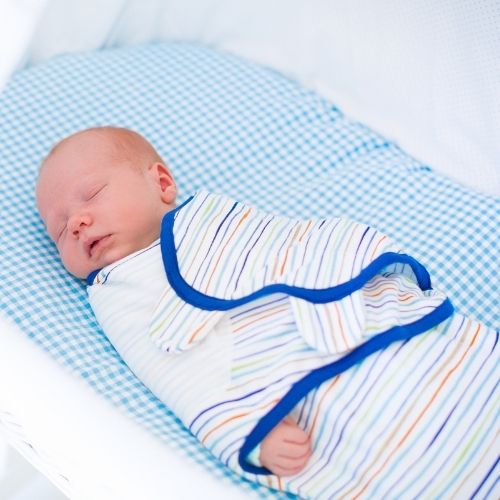
What is your approach to meal and snack times?
Some daycares offer food services while others require you to pack your own food. It’s also important to note how they handle things like food allergies. If your child were to develop food allergies, how would they ensure their safety?
Additionally, if you are sending an infant it is important to note how they handle breast milk and formula. It’s important to know if your childcare provider is following safe breast milk and formula handling policies and proper milk storage guidelines.
Related: 31+ Breakfast Ideas For 1-2 Year Olds
Is there a daycare waiting list?
Unfortunately most childcare centers have long waiting lists. I would recommend looking for a daycare as soon as you find out you are pregnant – the waiting lists can sometimes be a year or more for a good daycare center! It is rare to find a center with immediate availability.
How do you handle potty training?
If your child is in the process of toilet training, it’s important to know how the daycare will support them in this process. Some daycares will handle the potty training from start to finish, while others take a very hands-off approach. I have heard some daycares will request that you send your child in training underwear or pull-ups while others are not so strict and see accidents in regular underwear as a normal part of the learning process.
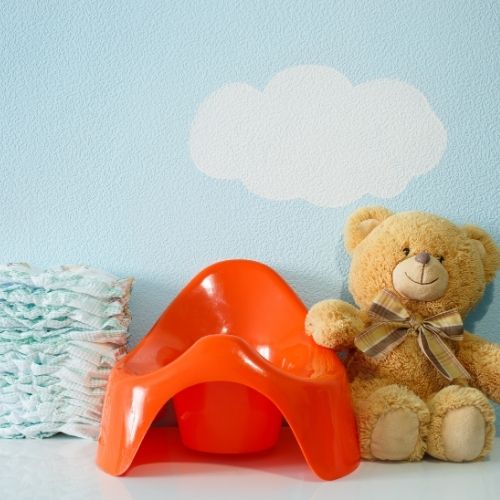
Related: 10 Undeniable Signs Your Toddler is Ready to Potty Train
What activities do you offer for the children?
Asking about the activities offered can give you insight into how the daycare promotes learning, creativity, and physical activity among the children.
Group and individual activities help foster child development. Some teachers will create lesson plans and follow curriculums while others are more focused on free play and child led learning. Neither is right or wrong but finding a school with a philosophy that matches your own will help ensure a smooth transition and positive experience.

You can also ask if they offer opportunities to develop gross motor skills, fine motor skills, creative outlets, etc.
How do you communicate with parents?
Each center has its own personality when it comes to parent communication. Good communication is key to make sure you are in the loop on your child’s daycare experience.
Some facilities use a more digital communication approach with things like apps or emails to keep in touch. Others may use a written daily report to tell you about your child’s day. In many centers there will be parent-teacher conferences throughout the year to discuss your child’s goals and progress. If your facility does none of these things it may be cause for concern. Good and reliable communication ensures everyone is in the loop!
Some daycares focus on daily updates while others use a weekly report sheet. Either way, daily communication can occur at drop-off and pick-up.
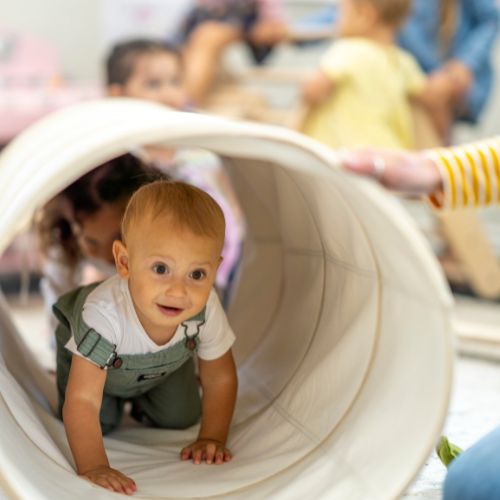
What is your drop-off and pickup policy?
If you have a varying work schedule this is especially important! Is there a set drop-off and pickup time? Do they offer late pick-up?
Many centers offer early drop-off and late pick-up, though there may be an additional fee. There is often a fee if you are outside those areas (and it can get really pricey!)
What does a typical day look like?
Each room likely has a different daily schedule dependent on the age group and child needs. It’s always good to know what your child will be doing on a daily basis!
Here are some things to note in the daily schedule:
- Is outdoor time implemented, and if so, how much? Do they provide things like sunscreen and bug spray or should you provide your own? Outdoor play is so important – especially for older children in full time care who may not be able to go outside after pick-up.
- For younger children, are developmental activities like tummy time worked into the daily routine?
- Are things like music, story time, and nursery rhymes implemented daily?
- What opportunities are there for my child to work on fine and gross motor skills?
What is your policy on screen time?
Understanding the daycare’s policy on screen time, including how much and what type of screen time is allowed, can help ensure that your child’s screen time is appropriate. Many centers use educational apps or movies as part of the daily routine.

How do you handle transitions between activities?
Knowing how the daycare handles transitions between activities can help ensure that your child’s day is structured and predictable. This can promote a sense of security and well-being. If your little one struggles with transitions this can be especially important.
What is your policy on visits from parents?
Inquiring about the daycare’s policy on visits from parents can help ensure that you feel welcome to drop in and observe your child at any time. Some daycare centers encourage parent volunteers and drop-ins while others find it to be disruptive to the day.
How do you handle children with special needs?
If your child has any special needs, it’s important to know how the daycare will accommodate them and provide the support they need to thrive. Some centers work closely with different agencies to get support services for the children. This is important for kids benefitting from speech therapy, occupational therapy, and/or physical therapy.
What is your approach to early childhood education?
So much social and emotional development occurs in a daycare setting along with other areas of childhood development. Knowing their approach and education plan can help choose the best daycare for your child’s needs.
Most childcare centres follow a play-based learning approach. This is pretty open-ended, but there are different programs they may choose to follow.
Can you provide references from other parents?
Asking for references from other parents who have used the daycare’s services can help you gather feedback and make an informed decision about whether it’s the right fit for your child. If your center does not give out parent info for references, consider using social media groups to ask for parent opinions. Facebook groups and Reddit threads are great ways to connect with other parents in the area and get the scoop on different daycares.
If you have a child in daycare, what questions helped you find the right fit? Were there any questions you didn’t ask that you wished you had?
